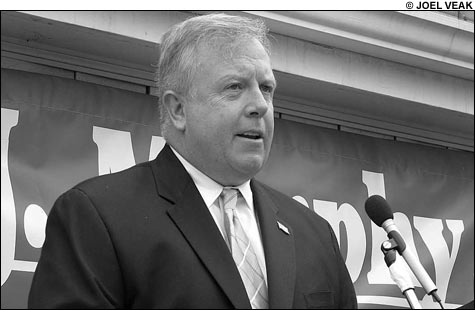
DOUBLY BLESSED Murphy is courting the support of progressives and Deval Patrick, as well as the “neighborhood vote” and Dapper O’Neil |
Pride politics
The big hurdle — and possibly the key to the whole election — might be with the city’s politically active gay community, which, as Murphy is willing to admit, he has historically struggled to impress. Murphy is with them on the issues now, including gay marriage. But some see him as a late-comer to the cause. He didn’t march in the city’s Pride Parade until 2006, and some feel that he has been too willing to associate with people considered homophobic by the gay community — such as Dapper O’Neil. |
If this were five years ago, at-large city councilor Stephen Murphy might have been thrilled by this past week’s Howie Carr column in the Boston Herald, which depicted Murphy visiting ailing octogenarian Albert “Dapper” O’Neil in the Deutsches Altenheim rest home. The political pat on the back from conservative Boston-Irish icons Carr and O’Neil is worth its weight in photo-op gold with the so-called neighborhood vote — Catholic senior citizens, cops, firefighters, and long-time white Bostonians — who are still the most reliable voters in city elections.But in the past few years, Murphy has recast himself to reflect the changing city. Whether due to a change of heart or, as some charge, pure political calculation, Murphy has morphed from one of the good old boys to a more progressive, gay-supporting, minority-friendly pol.
Today’s Murphy seems chagrined by the Carr column, insisting to the Phoenix that he didn’t know that Carr would be there, and that he didn’t want to be mentioned in the Herald’s article.
Instead of touting his ties with the notoriously homophobic and provincial Dapper, Murphy adds, he wants people to know about what he calls “a very positive, personal dynamic between Deval Patrick and Steve Murphy” — a dynamic that will be on display when the progressive, African-American governor holds a high-profile fundraiser for Murphy at Anthony’s Pier 4, a week before the November 6 city election.
That event — not yet announced by Murphy, but confirmed to the Phoenix by the Patrick campaign committee and by officeholders planning to attend — is Murphy’s reward for his early and active support of Patrick’s gubernatorial campaign. And it might well make the difference in Murphy maintaining one of the four at-large seats on the council.
Murphy’s decision to work for Patrick while other council members remained neutral or offered little else than their endorsements was a masterstroke, says one close observer of local politics, who is not associated with any of the at-large candidates.
“Whether Deval Patrick won or lost,” says the source, “[Murphy] had a lot to gain in the liberal and minority parts of the city” by stumping for him. (Murphy’s support for populist Democratic presidential aspirant John Edwards could be viewed in a similar light.)
Not long ago, Murphy seemed content with a businessman-turned-hack image. After a private-sector career, he worked for then–Senate president Billy Bulger, followed by stints on staff with the attorney general and secretary of state, before joining the city council in 1997. He was best known as a conservative, budget-savvy numbers guy, and a constituent-services deliverer with an eye constantly drifting to other offices.
Then in 2004, the bizarre happened: conservative, white, Irish Murphy lost an election for a law-and-order office — Suffolk County Sheriff — to a black woman. That would be enough to teach him that the city’s political dynamics had changed. But Murphy lost specifically because virtually every prominent African-American, gay-rights, Latino, and liberal leader in the city actively backed then–acting sheriff Andrea Cabral — even though she had become a Republican to get the appointment from then-governor Jane Swift, while Murphy had been passed over for refusing to leave the Democratic Party.
Rather than spiting the new Bostonians who had rejected him, Murphy seems to have learned that he needs them, and began the shift that will culminate with Patrick’s blessing later this month.
Shifting gears
Murphy will never be the first choice of as many voters as his rivals Felix Arroyo, Sam Yoon, or Michael Flaherty. But at-large voters get to choose up to four candidates. And for the past decade, Murphy — often perceived as a second- or third-choice candidate — has managed to win enough ballots to finish in the top four, which is good enough to win re-election.
“Murphy is the master of the third vote,” says one person active in the at-large campaign.
Those third votes are increasingly to be found on the ballots of the city’s growing minority and progressive voters, and boarding the Patrick train early was a perfect maneuver to secure them. Not only did Murphy pile up valuable chits with the eventual governor, he got to build relationships with others working for the Patrick campaign, including many in Boston’s African-American community. “People who didn’t know me personally,” notes Murphy, “had an opportunity to work with me toward a common goal.”